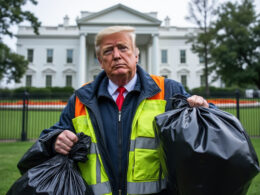Not a Good Sign, When Journalists Resign
Freedom of speech, freedom of the press; these are all signs that a democratic government system is working as it should. But what happens when democracy doesn’t function very well or is starting to disintegrate into something else?
We can all pretty well hone in on the answer to that question.
At first, it becomes uncomfortable to express your opinion, regardless of how grounded or baseless that opinion might be. Then it becomes “career-ending” to say what you really think. Then you are punished for “thinking” outside the groupthink. That is what happens. This is what is starting to happen now.
Want proof?
Just look around with open eyes and a clear, unbiased view. We are seeing a long line of journalists put down the pen. There is something that is starting to feel very wrong about the democratic system, which we all are privileged to enjoy.
It is not only the free-spirited Libertarians who are raising this concern; others are as well. The latest casualty of truth-telling is Bari Weiss, a writer and opinion editor for the New York Times’ opinion department.
Here is just a small excerpt from her blog:
“Part of me wishes I could say that my experience was unique. But the truth is that intellectual curiosity—let alone risk-taking—is now a liability at The Times. Why edit something challenging to our readers, or write something bold only to go through the numbing process of making it ideologically kosher, when we can assure ourselves of job security (and clicks) by publishing our 4000th op-ed arguing that Donald Trump is a unique danger to the country and the world? And so self-censorship has become the norm.
What rules that remain at The Times are applied with extreme selectivity. If a person’s ideology is in keeping with the new orthodoxy, they and their work remain unscrutinized. Everyone else lives in fear of the digital thunderdome. Online venom is excused so long as it is directed at the proper targets.
Op-eds that would have easily been published just two years ago would now get an editor or a writer in serious trouble, if not fired. If a piece is perceived as likely to inspire backlash internally or on social media, the editor or writer avoids pitching it. If she feels strongly enough to suggest it, she is quickly steered to safer ground. And if, every now and then, she succeeds in getting a piece published that does not explicitly promote progressive causes, it happens only after every line is carefully massaged, negotiated and caveated.”
Why is this important, and why should we care?
After all, isn’t our primary concern focused in another area – specifically finance and markets?
The quintessential ingredient of capitalism is innovation: the ability to “think outside the box.” How many times have you heard that saying before? But did you ever stop and think what precedes it?
Freedom of expression without fear of reprisal; that comes to mind.
History has shown us many examples of how looking at things from a different perspective, trying something that has never been done before, can produce the result we want to achieve.
An example of this can be found in one of Ivan’s old Letters, where a CEO of a failing gold company turned to tech in the most unconventional way. His “outside-the-box” actions led to his Company becoming one of the biggest gold producers in the world.
Advances in science, technology, and business were possible because individuals were encouraged to try different things, to fail, to be supported in failure, to try again and again, and ultimately to succeed.
This underlying precept is the glue that creates the internal strength in democratic systems.
Think about it for a moment: why are virtually all of man’s greatest inventions, contributions to science, and understanding occurring in countries that promote and encourage freedom of expression? The answer is self-evident.
This brings me around to the subject of China.
How will China be accepted by the world when they have shown a predilection to be content with letting other countries innovate and then simply intruding on that innovation by ignoring patent protections and copying it or, worse yet, outright theft?
There is a hotly contested issue between China and the USA happening right now – Huawei.
The issue is simple: the US does not want China to introduce 5G technology to their country because it does not trust China. The fear is that China will create an all-encompassing spy net over the US. Say goodbye to keeping innovation for the benefit of the US industry. China would always be in front of technological advances because it would have the power, through control of a 5G network, to see what everyone is doing, all the time. This sounds a bit Orwellian, but it’s true.
The US is not prepared to let this happen under any circumstance.
Canada has already got a taste of what its like to let the Chinese burrow deep inside its leading technology company that was, at the time, at the forefront of innovation and technological change.
https://www.bloomberg.com/news/features/2020-07-01/did-china-steal-canada-s-edge-in-5g-from-nortel
The US currently has engaged in going trade deals with China. It views these deals as a “handshake deal with the devil” – albeit a Chinese one.
Trading with a country that does not share your values is different than handing them the keys to the kingdom by allowing real-time surveillance of the American industry.
Today, Britain announced that it was revoking its use of Huawei’s 5G technology. The US doesn’t want China to have a backdoor into shared information with other nations, including Britain. This would render shared intelligence gathering useless.
So it seems clear that China will remain a “bit player” until it adopts a business protocol that can be trusted by its trading partners. Sure, the West and Europe will trade with China. But, they will not trust them.
To be fair, China’s path to a more democratic society will require the current regime to cede power to the people. This will not happen without a struggle.
We are seeing is what happens when China tries to take power back from the people in Hong Kong. The iron fist of Communism is likely to crack a few heads to get this done.
In the meantime, the West stands by, unable to really provide any real assistance to the people of Hong Kong. It is at its heart, a “Chinese problem.” It must be resolved by China and Hong Kong, period.
The people of China will come to realize that freedom does not come without a price.
France paid this price with the French Revolution; the same for America with the American Revolution. Will China one day have a Chinese Revolution?
All of these struggles share one common theme: freedom and fairness.
The Chinese people will one day ask these very same questions of themselves. Am I free?
Is this fair?
-John Top












